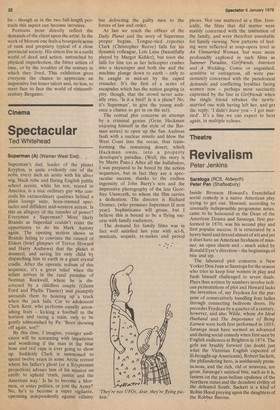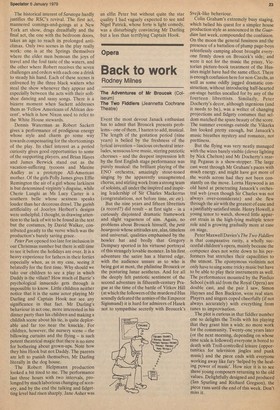Theatre
Revivalism
Peter Jenkins
Saratoga (RCS, Aldwych) Peter Pan (Shaftesbury) Inside Bronson Howard's Frenchified social comedy is a native American play trying to get out. Howard, according to unusually indispensible programme notes, came to be honoured as the Dean of the American Drama and Saratoga, first performed in 1870, was his second play and first popular success. It is structured by a heavy hand and devoid almost of wit and yet it does have an American freshness of manner, an open charm and — much aided by Ronald Eyre's direction — the beginnings of bite and zip.
The laboured plot concerns a New Yorker Don Juan at Saratoga for the season who tries to keep four women in play and finds himself challenged to seven duals. Plays thus written by numbers involve tedious permutations of plot and Howard lacks the invention of, say Feydeau for the purpose of consecutively bundling four ladies through connecting bedroom doors. He precedes Feydeau by a quarter of a century, however, and also Wilde, whose An Ideal Husband and The Importance of Being Earnest were both first performed in 1895; Saratoga must have seemed an advanced and daring social comedy when first seen by English audiences at Brighton in 1874. The girls are brashly forward (no doubt just what the Victorian English expected of ill-brought-up Americans), Robert Sackett, the philandering hero, is assiduously promiscuous, and the rich, old or nouveau, are gross. Saratoga's satirical bite, such as it is, fastens on the post-bellum opulence of the Northern states and the decadent civility of the defeated South. Sackett is a kind of Robin Hood preying upon the daughters of the Robber Barons. The historical interest of Saratoga hardly justifies the RSC's revival. The first act, mannered comings-and-goings at a New York art show, drags dreadfully and the final act, the one with the bedroom doors, takes an age to reach its prolonged anticlimax. Only two scenes in the play really work: one is at the Springs themselves where the elder men bemoan the joys of travel and the foul taste of the waters, and the other where Robert receives the seven challenges and orders with each one a drink to steady his hand. Each of these scenes is enlivened by the three black waiters who steal the show whenever they appear and especially between the acts with their softshoe dancing and sassy songs. There is a bizarre moment when Sackett addresses them as 'Fellow Americans of African descent', which is how Nixon used to refer to the White House stewards.
Dennis Waterman as Robert Sackett gives a performance of prodigious energy whose style and charm go some way towards compensating for the shortcomings of the play. Its chief interest as a period curiosity gives good opportunities to some of the supporting players, and Brian Hayes and James Berwick stand out as the vacation-suffering tycoons and Maxine Audley as a prototype All-American • mother. Of the girls Polly James gives Effie Remington the air of a girl whose larkiness is but determined virginity's disguise, while Cherie Lunghi as Ms Lucy Carter is a southern belle whose sexiness speaks louder than her decorous drawl. The garish artificiality of Jocelyn Herbert's designs were unhelpful, I thought, in drawing attention to the lack of wit to be found in the text but the costumes, by David Walker, contributed greatly to the verve which was the production's barely saving grace.
Peter Pan opened too late for inclusion in our Christmas number but there is still time to see it before the holidays are over. It is a heavy experience for fathers in their forties especially when, as in my case, seeing it belatedly for the first time. Why should we take our children to see a play in which Daddy is the villain? How much of Barrie's psychological innuendo gets through is impossible to know. Little children neither notice that it is the same actor playing Mr Darling and Captain Hook nor see any significance in that fact. Mr Darling's behaviour in act one, more interested in his dinner party than his children and making a childish scene about his tie, is quite deplorable and far too near the knuckle. For children, however, the nursery scene — the billowing curtains and the flying — is such potent theatrical magic that there is no time for bothering about grown-ups. Note how they hiss Hook but not Daddy. The parents are left to punish themselves, Mr Darling literally in the dog house.
The Robert Helpmann production looked a bit tired to me. The performance last three hours with two intervals, prolonged by much laborious changing of scenery, and by the end the talking and fidgetting level had risen sharply. Jane Asher was an elfin Peter but without quite the star quality I had vaguely expected to see and Nigel Patrick, whose forte is light comedy, was a disturbingly convincing Mr Darling but a less than terrifying Captain Hook.































 Previous page
Previous page